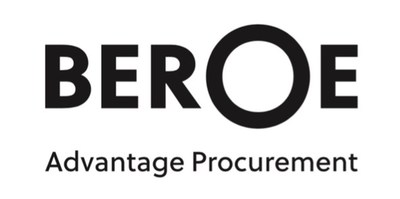RALEIGH, N.C., April 15, 2021 /PRNewswire/ -- With a projected market size of $32.3 billion in 2020, the global corporate cards market is expected to witness a compound annual growth rate of 7.3 percent between 2020 and 2026, says Beroe Inc.

The coronavirus outbreak will substantially decrease the volume of physical corporate card transactions, especially due to restrictions and drops in business travel. However, this impact on plastic cards would be only moderate, subject only till the time corporates are experiencing the limited usage of plastic cards due to COVID-19. The volume of contactless card transactions is expected to surge up drastically using the mediums like the internet, mobile phones-mobile wallets for making payments. Owing to the current scenario, companies should increase virtual Card utilization to ensure safety and security from corona infections and online fraud risk.
Beroe, which is based in North Carolina, further stated that procurement experts can access this report on its recently launched market intelligence platform Beroe LiVE.Ai: https://www.beroeinc.com/beroe-live-ai/
Breaking down the regional markets, the North American corporate card market size was estimated at $14.1 billion in 2020. It could grow by 4-7 percent in 2020-2021, largely driven by the demand for corporate and P-cards from the government as well as large corporations. Europe, with an estimated corporate cards market size of $7.8 billion in 2020, could grow by 7.4 percent. The Asia-Pacific region, with an estimated $7.1 billion market size in corporate cards, could witness a growth of approximately 7.7 percent in 2020-2021 where increasing business travel spending is a major driving factor for the growth of the commercial or corporate card services market.
Meanwhile, Latin America, Middle East, and Africa have the smallest estimated corporate cards market share at $3.4 billion and are expected to see an approximately 6.6 percent growth in 2020-2021. Here, Mexico and Brazil are the two most matured markets in Latin America, followed by Argentina and Chile. However, penetration from card issuers in the other countries of Latin America has not been much.
According to Beroe Inc, the largest corporate card growth drivers are the increased merchant acceptance due to ease of receiving payments via widely adopted network providers like Visa, MasterCard, Amex, etc. Also driving growth in this industry is the shift towards non-cash payments for better spend visibility, control, and to optimize the working capital and formulation of flexible regulations to reduce interchange fees. This is expected to increase the acceptance of commercial or corporate cards among merchants in developing markets.
Security concerns such as fraudulence and the risk of illicit usage of corporate cards that have forced corporates to limit card issuance to senior members are among threats to the corporate cards industry. Lack of supplier acceptance corporate travelers who do not prefer cards due to its limited acceptance in some of the less matured or moderately matured markets - as well as the burden of additional fees on small merchants for accepting card payments, which includes, license fees, interchange fees, acquirer fees, and processing fees - are among other factors that could hinder the growth of the corporate cards market.
The card network acceptance/adoption for MasterCard and Visa are the highest, followed by Amex. Of these, the card network providers MasterCard and Visa have cut their predictions for revenue amid the COVID-19 pandemic outbreak because the market has observed a decline in online travel purchases, including hotels and airlines, which generally have a higher average transaction value contributed by the corporate travelers or buyers.
Key Findings:
- Purchasing transactions largely held by the buyer companies are via online mode in order to avoid personal touch. Post revival, these companies would experience increased physical card usage and thereby increase in rebate programs associated with those cards.
- Buyers are trying to consolidate spend across various commercial card products to help them gain better visibility and enhance negotiation with suppliers.
- Corporate card issuers have been forming alliances to widen their geographical capabilities. Especially global players like American Express, Citi, HSBC, AirPlus, and many others. This could help address the client's need for global management of information as they allow for data consolidation.
- Suppliers are investing in newer technologies to better service, providing customers improved security, acceptance, and control.
- Businesses will have a higher dependency on virtual corporate cards in the next couple of years.
The report from Beroe includes:
- Trends and innovations
- Industry analysis
- Market (regional) analysis
- Procurement best practices
- Supplier analysis/ Key supplier trends
- Key technological trends
- Market overview
- Impact of COVID-19 on corporate cards
About Beroe Inc.
Beroe is the world's leading provider of procurement intelligence and supplier compliance solutions. We provide critical market information and analysis that enables companies to make smart sourcing decisions-leading to lower costs, greater profits, and reduced risk. Beroe has been providing these services for more than 15 years and currently works with more than 10,000 companies worldwide, including 400 of the Fortune 500 companies. For more information about Beroe Inc., please visit https://www.beroeinc.com/.
Media Contact:
Debobrata Hembram
debobrata.hembram@beroe-inc.com
Logo: https://mma.prnewswire.com/media/777512/Beroe_Logo.jpg

